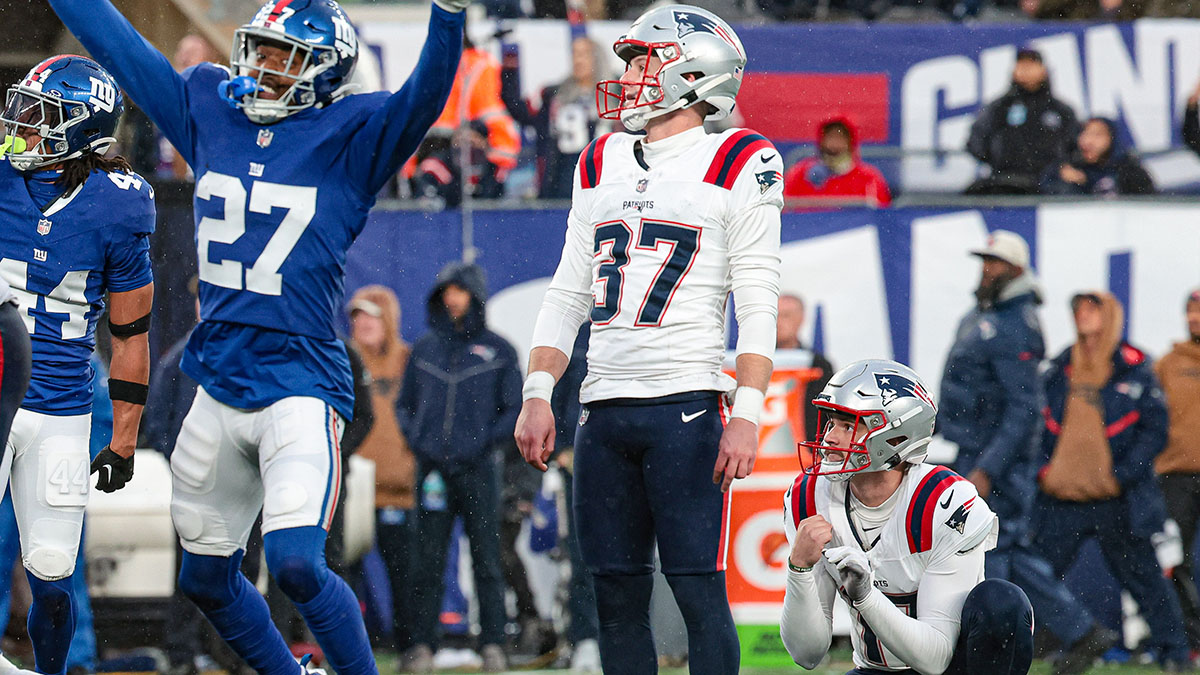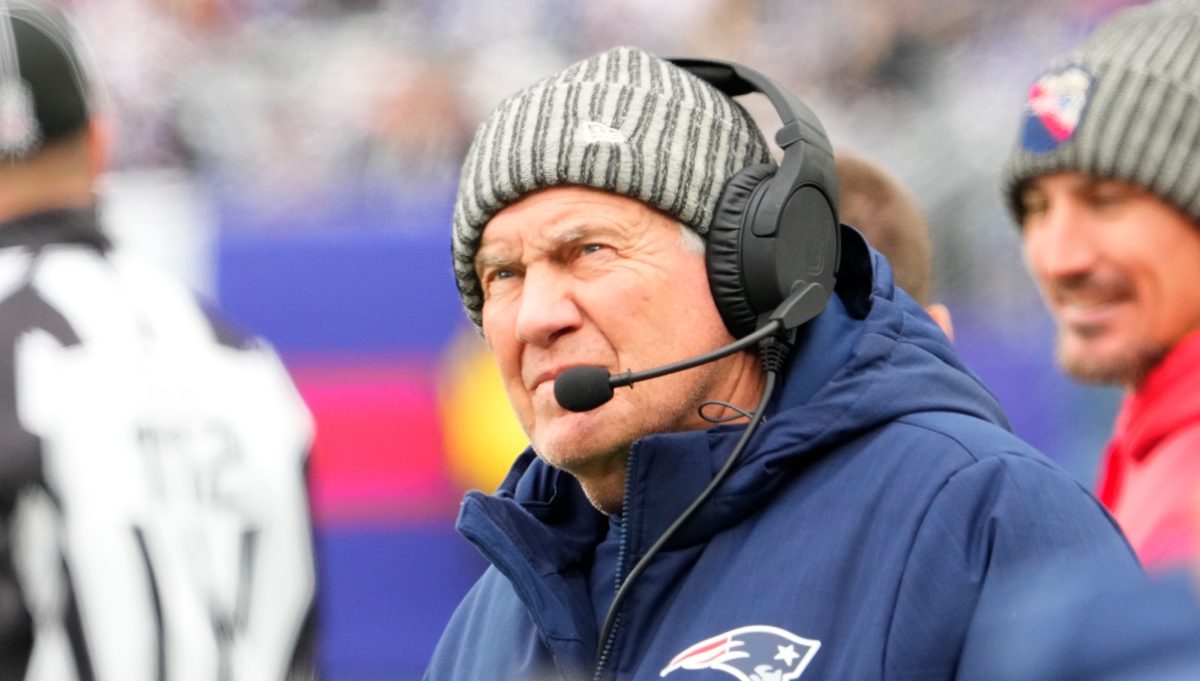Bill Belichick's run with the Patriots has been marked by superlatives: greatest coach, greatest dynasty, greatest winner. To that list we may soon add an unexpected entry: worst Patriots team ever.
Much like a pile of freshly steaming garbage slides inevitably to the bottom of the landfill, these Patriots seem doomed to their fetid, festering fate after yet another embarrassing performance in Sunday's 10-7 loss to the woeful Giants.
Neither team exactly grabbed destiny by the beard, leading to half-hearted talk of tanking. But accusing the Patriots of losing on purpose suggests they have the capacity, if they so choose, to win. We now have 11 weeks and counting of evidence to the contrary.
Stay in the game with the latest updates on your beloved Boston sports teams! Sign up here for our All Access Daily newsletter.
And so our attention turns from the heights of the Tom Brady Era (soon to be immortalized by an Apple TV+ documentary series that should thus begin our long winter of Living in the Past) to the wretched lows of whatever this is.
The Patriots are so bad that after Chad Ryland shanked the game-tying field goal at the buzzer, most of us reacted similarly: At least we don't have to watch overtime.
🔊 Patriots Talk: Patriots give off disengaged vibe in loss to Giants | Listen & Subscribe | Watch on YouTube
It's hard to imagine a Patriots team as bad as this one, which doesn't run, can't throw, and even when it plays well defensively, is always sure to mess up the one play it absolutely, positively must have.
There's surprisingly little competition for worst ever in team annals. For such a nondescript franchise prior to Bill Parcells arriving in 1993, the Patriots were rarely terrible. In only four seasons did they fail to win at least three games, and we may yet make this No. 5 if the 2-9 squad loses out.
There's a case to be made that this team will end up being worse than all of them, so let's break it down.
1970: New to NFL and already a laughingstock
This team might as well be stapled with asterisks. For one thing, it was the Boston Patriots' inaugural season in the NFL. For another, it had not yet moved to Foxboro, which meant playing home games in Harvard Stadium. And finally, it mangled the head coach search by hiring the winning offensive coordinator of Super Bowl III, New York's Clive Rush, instead of the losing defensive coordinator, a future legend named Chuck Noll.
When Rush was nearly electrocuted at his introductory press conference in 1969 by an ungrounded microphone, it set the tone for his bizarre tenure, which ended midway through the 1970 season when he quit at age 39 because of an irregular heartbeat.
The Patriots finished 2-12 with the league's worst offense and defense, earning the No. 1 pick in the draft and selecting Stanford quarterback Jim Plunkett, who of course went on to win two Super Bowls with the Raiders.
Comparing an established Belichick team to this homeless one hardly feels fair.
MORE PATRIOTS COVERAGE
1981: Plenty of pieces, no results
Fresh off a pair of 10-6 seasons, the Patriots had every reason for optimism under coach Ron Erhardt, but everything fell apart.
They lost the opener and finale to the Colts by a total of three points, giving Baltimore its only two wins and the 2-14 Pats the first pick in the draft, which they wasted on defensive tackle Ken Sims, bypassing future Hall of Famers Mike Munchak and Marcus Allen, among others.
In between, the Pats lost eight games by a touchdown or less, including overtime defeats to the Steelers and Dolphins. Quarterback Steve Grogan, a dual threat in the modern mold, struggled through knee injuries and was benched, but the pieces of the next great Patriots team were in place, from running back Tony Collins to wide receiver Stanley Morgan to Hall of Famer John Hannah anchoring an offensive line that included center Pete Brock and rookie tackle Brian Holloway.
Though they whiffed on Sims, they hit a home run with their next pick by taking Iowa linebacker Andre Tippett, who joined a defense that included Steve Nelson, Don Blackmon, and Raymond Clayborn.
So while the record was awful, the team and the talent level weren't. Four years later, they'd be in the Super Bowl. It's hard to imagine we'll ever say the same about today's Pats.
1990: Simply disgraceful
If there's a squad that it will be tough to top, it's this one. From the disastrous hire of Rod Rust to replace Raymond Berry at head coach, to the stain of reporter Lisa Olson being sexually harassed in the locker room, this season is deservedly viewed as rock bottom.
The Pats started veteran Marc Wilson and rookie Tommy Hodson at QB for most of the year, though they won their only game with Grogan sporting a giant neck roll. They lost their final 14 games, often in embarrassing fashion, by an average score of 28-11.
Much like today's squad, they weren't blessed with much young talent, though they did boast standouts at left tackle (Bruce Armstrong), wide receiver (Irving Fryar), linebacker (Vincent Brown), and corner (Maurice Hurst).
The Patriots then compounded their mistake by trading the No. 1 overall pick to the Cowboys, who selected defensive lineman Russell Maryland. The Pats, meanwhile, struck out on virtually all of their picks, except fifth-rounder Ben Coates.
It's going to take some one-sided losses down the stretch for the 2023 Pats to match this squad, but if Mac Jones keep starting at quarterback, they might get there.
1992: Change is coming
The 1991 Pats went 6-10 with Hugh Millen at quarterback, and while they were no means good, they still found ways to be entertaining. The same could not be said of the 1992 squad, outside of two magical weeks behind backup QB Scott Zolak, who fired imaginary six-shooters in November while winning two straight starts.
The Patriots took the field in existential turmoil after Busch family heir James Orthwein bought the team from Victor Kiam in the hopes of moving it to his native St. Louis. The unsettled feelings drifted to the locker room, where the avuncular Dick MacPherson, a long-time college coach, led with too soft a hand. Then as now, the Pats ranked next to last in offense and in the bottom third in defense, too.
The Patriots went 2-14 to earn the No. 1 pick and this time wisely kept it to choose quarterback Drew Bledsoe. That offseason, they also hired Parcells, starting the era that finally appears to be coming to an ignominious end, with the superlatives of the Brady years replaced by legitimate questions over just how historically awful this team actually is.



